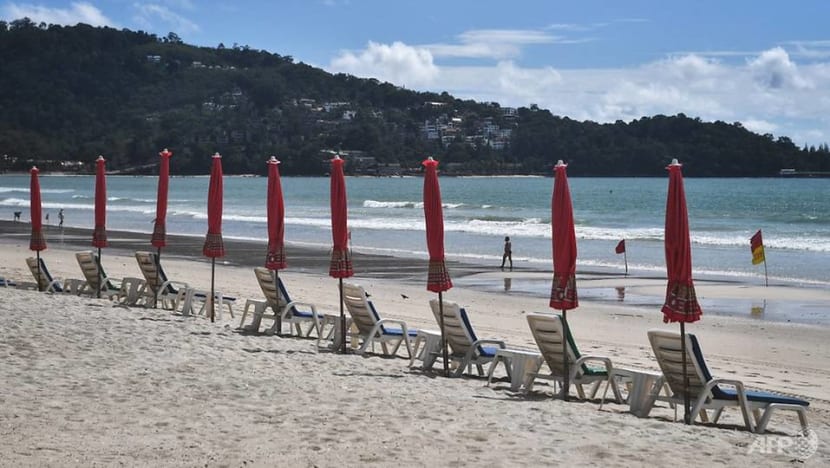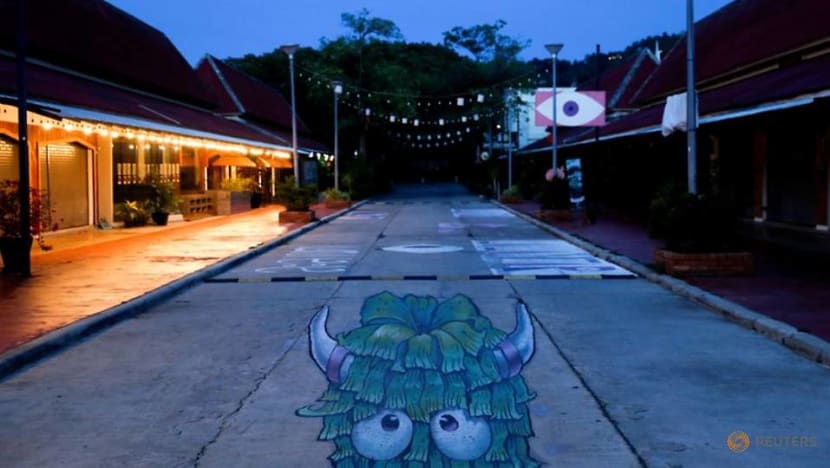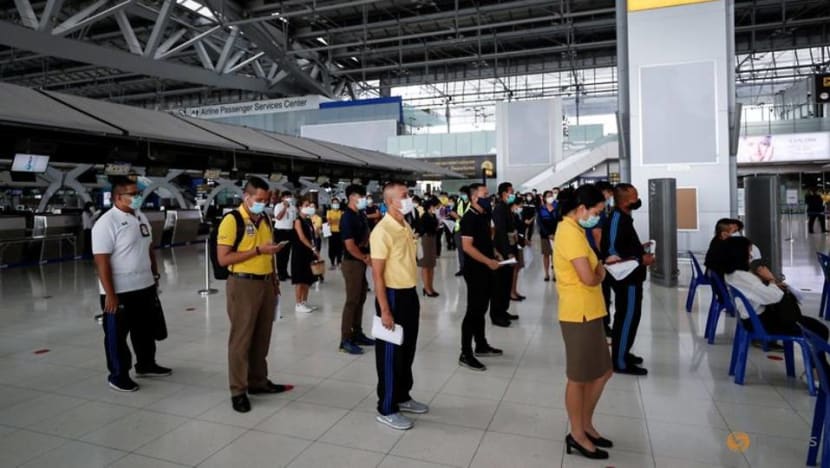Commentary: Thailand’s Phuket sandbox can peel open travel despite limitations
Phuket’s travel “sandbox” has the potential to be a game changer for the long-term suffering travel industry in Thailand, says NUS Business School’s Jochen Wirtz.

A lone tourist walks past deck chairs along an almost-empty Patong beach in Phuket on Oct 1, 2020. (Photo: AFP/Lillian Suwanrumpha)
SINGAPORE: In June, Thailand announced plans to reopen Phuket to tourists inoculated against COVID-19 and coming from low- and medium-risk countries.
If all goes according to plan, tourists fulfilling these conditions can travel to Phuket without having to go through quarantine.
They can wander around the island instead of being confined to their hotels.
THE GOOD NEWS
The good news couldn’t come sooner. After almost 18 months of travel bans and being effectively locked up in their homes, this urge to travel seems strong.
People are itching to take off again. To many, fun includes travelling with friends and family, dining out, going on sightseeing, shopping, playing sports, relaxing on the beach and enjoying the sun.
Phuket is an ideal destination for these activities. It was a highly popular spot with tourists from Europe, Australia, and many Asian countries before COVID-19 struck.
READ: Commentary: Requiring proof of vaccination for travel raises bigger questions
Thailand is sufficiently motivated to make this test a success and develop the required processes and policies accordingly. It has already lost US$50 billion in tourism revenue last year.
If travel was again almost as frictionless as it was before COVID-19, one might expect an avalanche of tourists hitting Phuket. In fact, demand could be overwhelming and the available capacity could fill up quickly.
Given that many other formerly popular destinations are not open to welcome tourists again, with many travel bubbles bursting, Phuket’s tourism industry would benefit from the early opening.
READ: Commentary: Targeted travel restrictions needed but careful not to undermine Changi Airport's connectivity
WILL PHUKET GET IT RIGHT?
There are many “ifs” and “buts”. The Phuket “sandbox” assumes that the local population achieves herd immunity, with some 70 per cent of the population inoculated by the time travel will be allowed. New infection cases have fortuitously stayed in the single digits since May.
Fully vaccinated tourists who tested negative before arriving will be surrounded by hotel staff who have been similarly vaccinated. Coming from somewhat similar risk profiles as Thailand, they are unlikely to pose an added risk.

Though the risks are not zero, research has shown that fully inoculated individuals are better protected from infection and hence are less likely to spread the virus. They will also have to stay in Phuket for 14 days before travelling to other parts of Thailand.
Phuket however still needs to work out practical details and policies.
For example, will Thailand really accept vaccination certifications regardless of vaccination brands? It had earlier in April only approved eight COVID-19 vaccine makers for foreign visitors seeking a shortened quarantine – Sinovac, AstraZeneca, Pfizer, BioNTech SE, Johnson and Johnson, Moderna and Sinopharm.
While a negative PCR test will be required before arrival, how often do tourists need to be tested while in Phuket? Ideally, travel to Phuket should not add extra costs to the traveller, such as those for testing.
READ: Commentary: Singapore-Australia air travel bubble is sensible but politically challenging
READ: Commentary: Costs of US travel bans come into sharper focus - for separated families, jobs and more
BUT IT TAKES TWO TO TANGO
The low number of hotel bookings at 20 per cent of occupancy, despite expressed interest from Europe, the UK and the Middle East, suggests the road ahead may be winding.
To be successful, the travel sandbox will have to be as frictionless, easy and convenient as possible. But even if travel to Phuket is easy, tourists may be less willing to travel if they are exposed to the hassle of quarantine, COVID-19 tests and other inconveniences when arriving back.
Singaporeans are unlikely to be attracted by the Phuket sandbox because Singapore has been strict with anyone returning to Singapore. Few, if any, would be willing to spend three weeks in quarantine after returning from a one- or two-week beach holiday.
This is notwithstanding Singapore Airlines hiking its flights from two to seven from July.

As such, Thailand will have to work with key feeder markets such as Australia and a number of European countries to develop travel corridors whereby ideally both sides do not require quarantine for travellers.
At a minimum, returning residents should be let back into the country without having to go through huge hassle but we all know how fragile travel bubbles can be.
Finally, travellers would be cognisant of the risks of changing travel restrictions and regulations. For example, will Australia let its residents return home if there was an increase in COVID-19 cases in Phuket?
READ: Commentary: Southeast Asia risks falling behind other regions in recovering aviation and tourism
ARE TRAVEL SANDBOXES THE WAY FORWARD FOR OTHER DESTINATIONS?
The world yearns to return to normality again. Travel is a big part of that pre-COVID story.
It was a mega trend before COVID-19 that grew year-on-year faster than the gross domestic product in most countries around the globe. It became a significant contributor to jobs and economic activity in many countries.
If Phuket’s sandbox proves successful, other tourist destinations may follow suit. Islands seem to be predestined for opening as travel can be better controlled. Ko Samui and Krabi are slated for a similar opening. Indonesian islands such as Bali could follow.
Local tourist industry and their employees will push for that. Tourism is arguably one of the most affected sectors that needs to get back on its feet. Thai Prime Minister Prayut Chan-ocha announced a bold plan to reopen Thailand to visitors within 120 days, calling this a calculated but necessary risk.
Of course, a massive vaccination programme of the local population would be a prerequisite.
Perhaps, the prospect of jobs and income will incentivise local politicians and industry players to get the required vaccines and convince their residents to get vaccinated.
On my end, I hope Singapore will join travel corridors to such relatively safe holiday destinations and I look forward to being able to travel again – in Phuket or otherwise.
READ: Commentary: This is why Singapore needs to save its airlines and aviation sector
BOOKMARK THIS: Our comprehensive coverage of the COVID-19 pandemic and its developments
Download our app or subscribe to our Telegram channel for the latest updates on the coronavirus outbreak: https://cna.asia/telegram
Professor Jochen Wirtz is vice dean for MBA programmes and a professor of marketing at National University of Singapore Business School. He is the co-author of the book Intelligent Automation – Welcome to the World of Hyperautomation.















